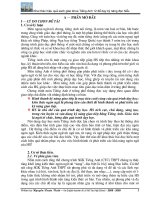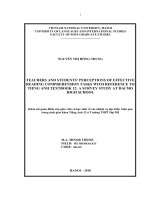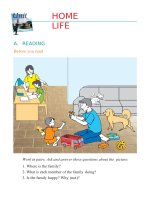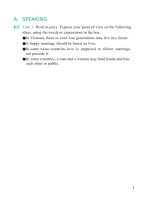Sách giáo khoa tiếng anh 12 phần 14
Bạn đang xem bản rút gọn của tài liệu. Xem và tải ngay bản đầy đủ của tài liệu tại đây (279.46 KB, 13 trang )
Task 3. Work in groups. Make a report on the sports results, using the
information in the scoreboard.
Example:
Vietnam and Myanmar played in the Women's Football Final. The
Vietnamese team won the gold medal. The result (score) was 2 − 1.
SCOREBOARD
22nd SEA Games
Football
Women’s Final:
Vietnam: 2
Third – place Playoff: Thailand: 6
Men’s Final: Volleyball Thailand:
Women’s Final:
2
Thailand: 3
Myanmar: 1
Malaysia: 1
Vietnam:1
Vietnam:0
A. LISTENING
Before you listen
Work in pairs. Ask and answer the following questions.
1. Look at the picture and say
what sport it is. Do you like
it? Why/Why not?
2. Can you guess what jobs the
players of Vietnam's Women's
Football team did after the
22nd SEA Games?
Listen and repeat.
odd
milkmaid
tempting
clear
deal
employee
proposal
podium
●
1
1
While you listen
Task 1. Listen to the first newspaper article about Amnat, the winner
in the 22nd Southeast Asian Games Pole Vaulting competition, and
answer the questions.
1. How many gold medals did Amnat win in the Pole Vaulting
competition?
2. Where does he come from?
3. How many metres did he clear?
4. Did he break the SEA Games record?
Task 2. Listen to the second newspaper article about the players of
Vietnam's Women's Football team and decide whether the statements
are true (T) or false (F).
T F
1. Vinamilk has offered jobs to 27 members of
Vietnam’s Women’s Football team.
2. The players will certainly work as milkmaids
when they stop playing football.
3. Most of them will be jobless when the Games are over.
4. The new employees will be trained right after the deal is signed.
5. The team’s goalkeeper hopes to open a restaurant.
After you listen
Work in groups. Discuss the following question: Which Vietnamese
footballer(s) do you like best? Why?
B. WRITING
Task 1. You are going to write a description of a football match
between your school’s team and one of your neighbouring schools’
teams. The following are the questions you have to answer when
describing the match, but they are jumbled. Work with a partner and
put the questions in the suitable sections.
1. How did each team play in the first half?/ second half?
2. What was the result?
3. When and where did the match take place?
4. Why was the football match held?
5. What did you think about the game?
6. What was the weather like on that day?
7. What teams took part in the match?
8. What was the spectators’ attitude?
9. Which team played better?
10. Who scored a goal?
SECTIONS:
Introduction: ........................................................................................
...............................................................................................................
Details of the match: ...........................................................................
...............................................................................................................
...............................................................................................................
...............................................................................................................
Conclusion:...........................................................................................
...............................................................................................................
...............................................................................................................
Task 2. Work in pairs. Ask and answer the above questions about a
football match you have watched recently.
Task 3. Write a
description of the
football
match
mentioned above,
based
on
the
results of Tasks 1
and 2. The Useful
Language
may
help you.
Useful Language
− in the first half,/second half,
− keep the ball away from the goal
− by a combination of passing and
dribbling…
− give a kick (shot) straight into the goal
− save a shot struck at close range
− score a goal/make a goal against…
− jump up and cheer
− players/captain/defender/striker/goalkee
per…
You may start your writing with:
To celebrate the Ho Chi Minh Communist Youth Union’s Foundation
Day, our School’s Sports Club recently played a friendly football
match with …… ……………………………………………………………..
Defender = Back
Midfielder = Half Back
● Pronunciation:
Attacker = Forward/Striker
Linking
● Grammar:
Double comparison
- Comparative + and + comparative
- The + comparative, the + comparative
C. LANGUAGE FOCUS
Pronunciation
●
Practise reading these sentences. Make sure you link the words
together as shown.
1. Look∪at these pictures.
2. The plane took∪off despite the fog.
3. Mrs. Brown’s quite∪old.
4. She’s from Australia.
∪
5. She has many friends in London.
∪
6. It’s upstairs.
∪
7. Tom used to live here.
∪
8. Put on your helmet, please.
∪
9. I want to move into the new flat with some friends.
∪
10. Don’t forget to turn off the lights.
∪
Grammar
Exercise 1. Match a half-sentence from box A with a suitable halfsentence from box B.
A
B
1. Finding a job is becoming
2. Travelling is becoming
3. As I waited for my interview,
I became
4. That hole in your pullover is
getting
5. As the conversation went on,
he became
6. The suitcase seemed to get
7. Her English is improving;
it’s getting
a. more and more nervous
b. bigger and bigger
c. more and more difficult
d. more and more talkative
e. more and more expensive
f. better and better
g. heavier and heavier as I
carried it upstairs
Exercise 2. Complete each of the following sentences, using the
structure comparative + and + comparative with the words in brackets.
Example:
It is becoming
to find a job. (hard) It
is becoming harder and harder to find a job.
1. His visit to New York seemed to get
busy at work. (short)
because he was very
2. Eating and travelling in this city is getting
3. As the day went on, the weather got
. (expensive)
. (bad)
4. We had to stop the discussion because the question was
becoming
. (complicated)
5. Your English is OK now, your pronunciation
6. Little John is becoming
has got
.
(good)
. (active)
7. As it was getting dark, it was becoming
in the house without electricity. (difficult)
8. I feel happy as my birthday is coming
to see everything
. (close)
Exercise 3. Complete each of the following sentences, using the
structure: the + comparative, the + comparative. Choose a suitable halfsentence from the box.
the faster you will learn
the more impatient he became
the sooner we will arrive
the higher your bill will be
the more I liked him
the better I feel
the more you want
the better the service
Example: The earlier we leave
The earlier we leave, the sooner we will arrive.
1. The warmer the weather
2. The more you practise your English
3. The longer he waited
4. The more electricity you use
5. The more expensive the hotel
6. The more I got to know him
7. The more you have
TEST YOURSELF E
I.
Listening (2.5 points)
Listen to the text and write down the missing word or number. The
first one has been done as an example.
Today we think of a book as a volume of many (0) sheets of paper
containing text, (1)
, photographs, etc. Because
of their durability and portability, the main uses of books are to
(2)
and distribute information. In ancient
times,
people wrote on clay tablets, wood or (3)
tablets tied
with cord, or book rolls to store information. Later, with the invention
of paper, the Chinese had the first book called Jingangjing (the
Diamond Sutra) printed in AD (4)
. In the 20th
century, despite the challenge from other media such as radio or
television and computer, books continued to be a primary means for
dissemination of (5)___________________, for instruction and
pleasure in skills and arts, and for the storage of human’s experience.
II.
Reading (2.5 points)
Read the text and decide which type of sport (A-E) corresponds with
each description. You may use any match more than once.
AQUATIC SPORTS
Aquatic sports − sports involving playing in or upon the water − take
various forms. The main activities include swimming, synchronized
swimming, diving and water polo. By swimming we mean the sport in
which players perform the act of moving through the water by using the
arms, legs, and body in motion. Swimming is an integral part of almost
all water-based activities. Closely related to swimming is synchronized
swimming where the players perform beautiful maneuvers to music and
diving. Water polo, on the other hand, is a game where two opposing
teams play against each other, attempting to score points by throwing a
buoyant ball into the opponent’s goal.
Underwater activities are less varied, the most popular of which are
snorkelling and scuba diving. Snorkelling involves swimming face
down just below the water surface while breathing through a slender
plastic tube called a snorkel. Scuba divers, on the other hand, carry a big
tank of air that allows them to breathe while deep underwater.
Aquatic sports have long been acknowledged as excellent ways to
take physical exercise. Furthermore, practising them is known to
produce both psychological and physical benefits which help to
improve mood states and reduce the risk of many serious diseases.
A. Swimming
B. Synchronized swimming
Type of sport
C. Water polo
D. Snorkelling
E. Scuba diving
Description
1
This team sport was developed from water
ballet.
2
The activity is also called skin diving because
so little equipment is used in this activity.
3
Considered one of the most complete forms
of exercise, this activity is the basic part of
many other aquatic sports.
4
This is a team sport and is played with a ball.
5
This activity is usually carried out in the
ocean where people want to explore the
underwater world.
Type of sport
III. Grammar (2.5 points)
In each pair of sentences below one sentence has a transitive verb
and the other an intransitive verb. Mark the sentences T (transitive)
or I (intransitive). The first one has been done as an example.
1. The postman calls at about 7 am every morning. (I)
They are going to call the new town Skelmerdale. (T)
2. You are not allowed to drive a car until you are 17.
She learned to drive when she was 18.
3. I've never deliberately hurt anyone.
My leg was beginning to hurt quite a lot.
4. You look just the same. You haven't changed a bit.
You can't change human nature.
5. We are running a course for English teachers.
I can't run as fast as I used to.
6. She is studying for a law degree.
He had studied chemistry at university.
7. He turned to Joan and began to explain.
He turned the handle and pushed the door open.
8. I don't think we've met before, have we?
Dan came to the airport to meet me.
9. He's only young, but he's learning fast.
What did you learn at school today?
10. Could you stop the bus, please? I want to get off.
Do you think you could stop in front of the post office?
IV. Writing (2.5 points)
In about 120 words, write about a book you have read recently. The report
should have the following information:
●
Name(s) of the author(s)
●
Year of publication
●
The title of the book
●
The length of the book
●
The main theme of the story
●
The setting of the story
●
The main characters
●
Your opinion of the book









